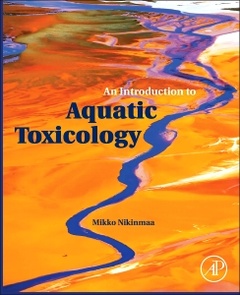Description
An Introduction to Aquatic Toxicology
Author: Nikinmaa Mikko
Language: English
Subjects for An Introduction to Aquatic Toxicology:
252 p. · 19x23.3 cm · Hardback
Description
/li>Contents
/li>Readership
/li>Biography
/li>Comment
/li>
An Introduction to Aquatic Toxicology is an introductory reference for all aspects of toxicology pertaining to aquatic environments. As water sources diminish, the need to understand the effects that contaminants may have on aquatic organisms and ecosystems increases in importance. This book will provide you with a solid understanding of aquatic toxicology, its past, its cutting-edge present and its likely future.
An Introduction to Aquatic Toxicology will introduce you to the global issue of aquatic contamination, detailing the major sources of contamination, from where they originate, and their effects on aquatic organisms and their environment. State-of-the-art toxicological topics covered include nanotoxicology, toxicogenomics, bioinformatics, transcriptomics, metabolomics, as well as water management and the toxicological effects of major environmental issues such as algal blooms, climate change and ocean acidification.
This book is intended for anyone who wants to know more about the impact of toxicants on aquatic organisms and ecosystems, or to keep up to date with recent and future developments in the field.
1. Introduction: What is Aquatic Toxicology?2. What is Causing Aquatic Contamination?3. Principles of Water Purification4. Sources and Transport of Chemicals in Aquatic Systems5. The Most Important Experimental Designs and Organisms in Aquatic Toxicology6. Factors Affecting the Bioavailability of Chemicals7. Chemical Uptake of Organisms8. Chemical Distribution in Organisms9. Detoxification10. Excretion of Compounds from Organisms11. Effects on Organisms12. Bioindicators and Biomarkers13. Interactions Between Chemicals14. Acute and Chronic Toxicity15. Interactions Between Natural Environmental Factors and Toxicity16. Effects of Chemicals on Aquatic Populations17. Effects of Chemicals on Aquatic Communities and Ecosystems18. Modeling Toxicity
Toxicologists and scientists new to the field of aquatic toxicology. Graduate students, postgraduates and teachers in the field of ecotoxicology.
- Provides with the latest perspectives on the impacts of toxicants on aquatic environments, such as nanotoxicology, toxicogenomics, ocean acidification and eutrophication
- Offers a complete overview, beginning with the origins of aquatic toxicology and concluding with potential future challenges
- Includes guidance on testing methods and a glossary of aquatic toxicology terms




